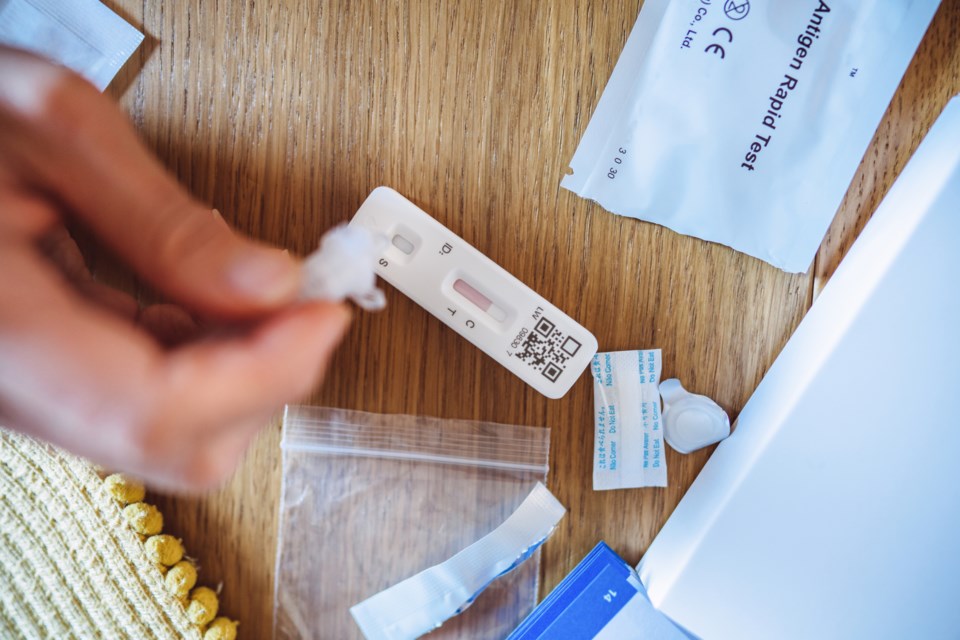B.C.'s number of COVID-19 hospital patients fell below 600 for the first time since Jan. 13, when a more restrictive method of counting those patients was in effect.
Of the 599 COVID-19 hospital patients in the province, 96 are in intensive care units (ICUs). This is the first time that the ICU patient count has dipped below 100 since Jan. 17.
The new way that B.C. counts COVID-19 hospital patients includes those who have gone longer than 10 days since first feeling symptoms, and are therefore no longer deemed infectious, as well as those who contracted the disease while in hospital for another reason. The broadened counts also include people who normally reside outside B.C.
Sadly, 12 people lost their lives while fighting COVID-19 infections in the past day, raising B.C.'s pandemic death toll to 2,851.
Of those, 10 were in the Fraser Health region, while the other two deaths were in the Northern Health and Island Health regions.
It was not revealed whether the people who died were in hospitals or seniors' homes. Provincial Health Officer Dr. Bonnie Henry recently said that about 40% of the new COVID-19 deaths are taking place in seniors' homes.
She has stressed that the most vulnerable group for serious illness and death are seniors older than 80 years, regardless of vaccination status.
That is why it is a concern that B.C. has 27 active outbreaks in health-care facilities and seniors' homes.
In the past day, there was one new health-care facility outbreak, at Cascade Gardens Seniors Community in Burnaby.
Outbreaks at Sunridge Place in Duncan, Sluggett House in Brentwood Bay, and The Heights at Mt. View in Victoria, have been declared over.
Henry added earlier this week that younger people are also dying from COVID-19.
"In the last few days, we've had four people in their 40s who have died from COVID-19 [in B.C.,]" Henry said on Wednesday.
"That's important. It reminds us that everybody has risk. Right now, we still have high levels of transmission, and if you don't have the protection that vaccine gives you, there is a possibility of having more severe illness and ending up in hospital."
Between Feb. 17 and Feb. 23, people not fully vaccinated with two doses accounted for 20.7 per cent of cases, according to government data. Between Feb. 10 and Feb. 23, those individuals accounted for 33.7 per cent of hospitalizations.
People without two doses of vaccine represent about 14.2% of B.C.'s total population.
The more detailed data for vaccinations is that 4,514,727 eligible B.C. residents have had at least one dose of vaccine, while 4,289,963 are considered fully vaccinated with two doses. There were 6,732 third, or booster shots provided in the past 24 hours, for a total of 2,562,401.
Statistics Canada data released this month said that in the 2021 census, B.C.'s population had increased 7.6 per cent between 2016 and 2021, and that the new total number of residents is 5,000,879.
Glacier Media's calculation therefore is that nearly 90.3 per cent of B.C.'s total population has had at least one dose of vaccine, and nearly 85.8 per cent of the province's total population has had two doses. More than 51.2 per cent have had their booster doses.
Health officials have been telling vaccinated people with mild symptoms to self-isolate and not get tested in order to reserve testing capacity for those who have more serious cases or who are clinically vulnerable. As a result, Henry has called case count data "not accurate," and the province has stopped reporting data for how many people in B.C. they believe are actively infected, and how many are thought to have recovered.
The province still reports the number of presumed new cases, and in the past 24 hours officials have confirmed 583 new cases out of 8,275 tests, for a 7.04% positive-test rate.
There are thought to have been at least 347,376 British Columbians who have contracted COVID-19 since the first case was detected in late January 2020. •



